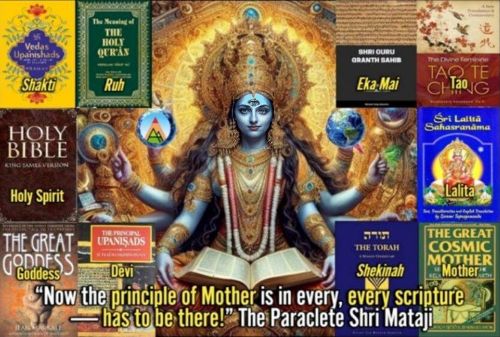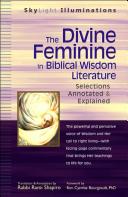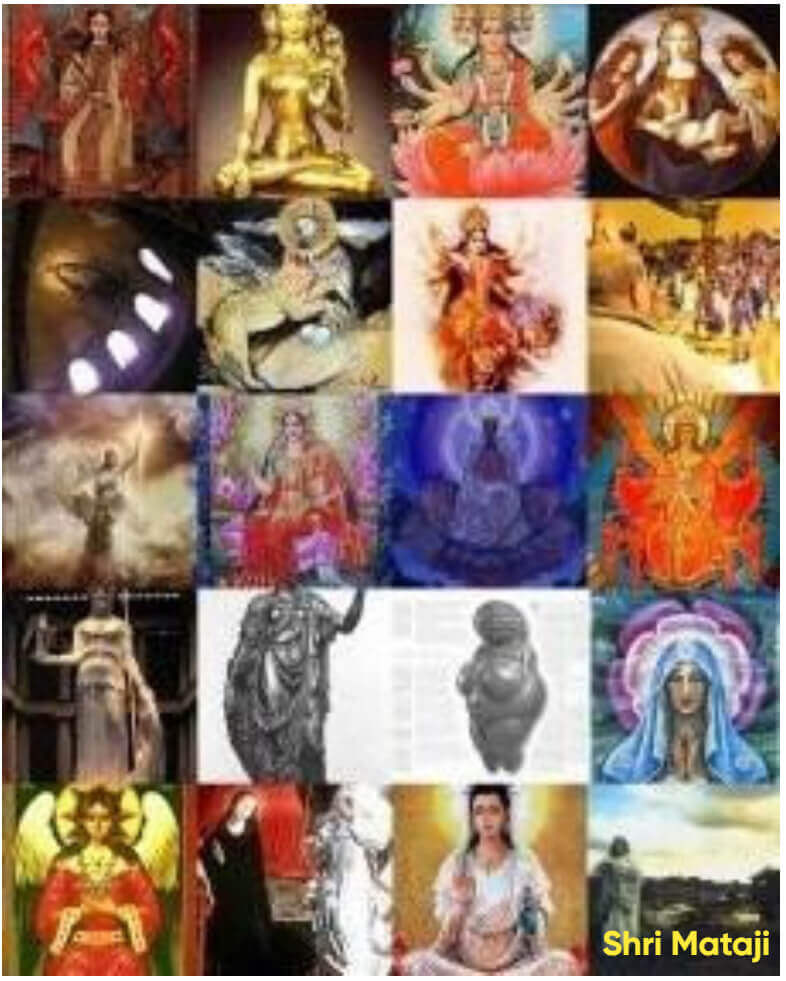The Divine Feminine in Biblical Wisdom Literature

This article explores the Divine Feminine in Biblical Wisdom Literature, revealing Her presence as Chochma in Hebrew and Sophia in Greek—feminine embodiments of divine wisdom. Through the poetic and prophetic voices of Psalms, Proverbs, Job, and the Wisdom of Solomon, She emerges as God's consort, the creative force behind existence, and the spiritual guide who invites humanity into intimate relationship. Rabbi Rami Shapiro’s reflections illuminate Her playful, compassionate nature and challenge patriarchal interpretations that have long silenced Her voice. The Divine Feminine is not a distant abstraction but the living breath of God, calling us to justice, humility, and transformation.

“You are intimate with Wisdom. She has known you from the beginning. You cannot hide from Her. On the contrary, you can take refuge in Her. This is what She offers you. You do not have to earn Her love or be other than you are. No pretense with Her; she knows you and loves you for who you are — Herself," writes Rabbi Rami Shapiro in this salutary and enlightening work. These teachings of Mother Wisdom are from the Psalms, Proverbs, Job, the Song of Songs, Ecclesiastes and the Greek texts, the Wisdom of Solomon and the Wisdom of Jesus Ben Sirach.
In both Hebrew and Greek, the original language of these texts, Chochma and Sophia are feminine nouns. She is Mother, God's consort and bride, the Divine Feminine through which God created the wild and wonderful world. Shapiro, as the Rev. Cynthia Bourgeault points out in the foreword, sees these teachings of the Hebrew Bible as taking their place "within the deeper Wisdom of humanity, adding their individual voices to the universal message since time immemorial: Only through the transformation of the heart can humankind arrive at a stable and enduring peace.” It's also a good thing that a man has taken it upon himself to trace the comings and goings of the Divine Feminine, given the long and dark period of male chauvinism that has desperately tried to silence Mother Wisdom's antiestablishment and nonhierarchical emphases. Of course, Andrew Harvey has for years done pioneer work in proclaiming the activities of Mother in all Her forms.
“Wisdom is not aloof. She is a player, a dancer, a celebrator of life, and the One who manifests it. She is a source of delight and delight itself. To be wise is to delight in creation,” writes Shapiro. There is a playfulness to the Divine Feminine which is evident in these passages and in the author's commentaries. Here is just one line to illustrate what we mean: "Wisdom is the doing of God — a flower is not Wisdom but flowering is." Don't get caught up in trying to figure out the attributes or the whys behind the actions of The Mother. Try to attune your life to her rhythms, and you will live all your days as an adventure.
Another example of playfulness: “The sage doesn't explain why things are; the sage simply engages what is. Why is beside the point. A stranger throws a stone at your head. You duck; you don't ask why. Later you may indulge in why, but the moment itself requires action. Why does God test you? Because it is God's nature to manifest moments of giving and moments of taking away and there is nothing that you or God can do about it.” Go with the flow and don't try to figure things out: that is for fools.
What devotion does Wisdom require? She wants us to put Her above having our way in everything — a hard nut to crack in and of itself. The Mother challenges us to let Her work through us, or as Shapiro puts it: “You are the breath of God. You are the way God is aware of God in the immediacy of your life. You are the way God feeds the hungry, clothes the naked, frees the wrongly imprisoned. You are the way God brings justice, mercy and humility to life. But because you want to be more, you end up being less; the way God brings honor, hate, and holocaust to every corner of the globe.” This is an important aspect of the Sacred Feminine, and it is our assignment as sages. One of the most exciting messages of this paperback is that there is another high and holy calling for us to consider. Sages of the world unite, there is much justice work to be done!”
Book Review
By Frederic and Mary Ann Brussat
The Divine Feminine in Biblical Wisdom Literature
Rami Shapiro
Skylight Paths 09/05 Paperback
The Divine Feminine in Biblical Wisdom Literature

For millennia, the wisdom of the Divine Feminine has echoed through the sacred texts and oral traditions of every great spiritual lineage. Yet, time and again, patriarchal structures have sought to suppress, distort, and deny Her voice, replacing Her boundless embrace with doctrines of exclusion and division. Today, humanity stands at a precipice—a world torn apart by strife, dogma, and discord. The time has come for the sages of the world to awaken, to rise beyond the confines of rigid ideologies, and to unite around the eternal and compassionate force of the Divine Feminine.

The Paraclete Shri Mataji, a beacon of truth in our modern age, reminds us that the Divine Feminine is the universal principle of unity, love, and spiritual ascent. She is the comforter, the nurturer, and the liberator—present in all scriptures, yet so often overlooked.
Whether as Chochma in Hebrew, Sophia in Greek, or the primordial Shakti in Indian spiritual traditions, She is the wisdom that transcends barriers, offering refuge to all who seek Her.
The Failure of Patriarchal Religions
Patriarchal religious institutions have long sought to define the divine in their own image, wielding power to exclude, suppress, and dominate. By marginalizing the Divine Feminine, they have created a fragmented world—one where unity is impossible because the very force that binds all together has been silenced. Dogma has taken precedence over direct experience, and rigid hierarchies have replaced the spontaneous joy of divine connection.
The sacred teachings of the Divine Feminine remind us that true wisdom is not found in rigid doctrine but in living experience. As Rabbi Rami Shapiro so eloquently describes, She is not aloof or inaccessible—She is intimate, playful, and present in every moment of our lives. She does not demand worship through fear but invites us into a loving embrace. She does not exclude but gathers all into Her fold.
The Divine Feminine as the Key to Global Unity
If humanity is to transcend its cycles of conflict, then we must return to the wisdom of the Divine Mother. She is the essence of inclusivity, the bridge between faiths, and the healer of divisions. To attune oneself to Her rhythm is to live in harmony with creation, to act with justice and compassion, and to relinquish the ego-driven need to control and dominate.
The call is clear: sages, mystics, and seekers from all traditions must step forward and reclaim Her presence in our spiritual landscapes. This is not about abandoning traditions but fulfilling them—rediscovering the heart within every sacred text, recognizing that at their core, all spiritual paths lead back to Her embrace.
Our Role as Sages
The wisdom of the Divine Feminine calls for action, not passive contemplation. As Her instruments, we are the breath of God, the hands that feed the hungry, the voices that speak for the voiceless. We must dismantle the structures of division and replace them with communities of love, respect, and understanding. The Mother does not seek blind obedience but a world in which every being is empowered to live in the fullness of their divine nature.
The ancient sages knew that only through the transformation of the heart could humanity find lasting peace. Now, we must heed that message once more. Let us rise as one—beyond creed, beyond nation, beyond dogma—and walk together in the luminous path of the Divine Mother.
Sages of the world, the time is now. Let us unite in Her name.
Pariah Kutta (https://adishakti.org)OpenAI. (2025). ChatGPT [Large language model]. https://chatgpt.com
Related Articles:
NATURE OF THE DIVINE MOTHER OR HOLY SPIRIT
The Goddess is Supreme Feminine Guru
Worshiping Devi is Direct Worship of Brahman
MahaDevi Research Paper (PDF)
The Divine Feminine in China
The Indian Religion of Goddess Shakti
The Divine Feminine in Biblical Wisdom Literature
Divine Feminine Unity in Taoism and Hinduism
Shekinah: The Image of the Divine Feminine
The Feminine Spirit: Recapturing the Heart of Scripture
Islam and the Divine Feminine
Tao: The Divine Feminine and the Universal Mother
The Tao as the Divine Mother: Embracing All Things
The Tao of Laozi and the Revelation of the Divine Feminine
Doorway of Mysterious Female ... Within Us All the While
The Eternal Tao and the Doorway of the Mysterious Female
Divine Feminine Remains the Esoteric Heartbeat of Islam
Holy Spirit of Christ Is a Feminine Spirit
Divine Feminine and Spirit: A Profound Analysis of Ruha
The Divine Feminine in Sufism
The Primordial Mother of Humanity: Tao Is Brahman
The Divine Feminine in Sahaja Yoga
Shekinah: She Who Dwells Within
Shekinah Theology and Christian Eschatology
Ricky Hoty, The Divine Mother
Centrality of the Divine Feminine in Sufism
A God Who Needed no Temple
Silence on (your) Self
The Literal Breath of Mother Earth
Prophecy of the 13 Grandmothers
Aurobindo: "If there is to be a future"
The Tao Te Ching and Lalita Sahasranama stand alone
New Millennium Religion Ushered by Divine Feminine
A Comprehensive Comparison of Religions and Gurus
